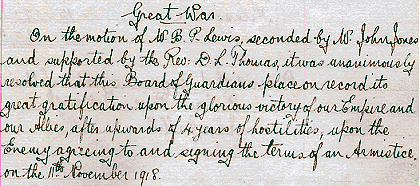
Care of the poor 19
Last days of the workhouse
Although anti-German feelings ran high locally, the Board were obliged to provide relief to a local woman who was married to an interned German, as the extract below indicates. One can only imagine what sort of experiences she must have had in a community coming to terms with very heavy losses at the front
Rhayader Board
of Guardians'
Minute Book
Powys
County Archives
R/G/C/8/1/23

The extract reads:-
"Mrs. Hanne - wife of an interned German
The Guardians granted the sum of 19/- per week for a period of
14 weeks to this person who has just lately removed from the
Builth Union into this Union, which sum is repayable by the Local
Government Board."
Like every other community in Britain, the numbers of killed and wounded came as a shock in a country where, for a long time, wars had only involved a few professional soldiers fighting far away. For most people in the community the final victory must have been greeted as much with relief as joy. The Board of Guardians was anxious to record its feelings at the time.
Board of
Guardians'
Minute Book
Powys
County Archives
R/G/C/8/1/23

"Great War
On the motion of W.B.P. Lewis, seconded by W. John Jones
and supported by the Rev. D.L. Thomas, it was unanimously resolved
that this Board of Guardians place on record its great gratification
upon the glorious victory of our Empire and our Allies, after
upwards of 4 years of hostilities, upon the Enemy agreeing to
and signing the terms of an Armistice on the 11th November 1918."
The end of the workhouse
As the twentieth century progressed
attitudes to the poor began to change. The introduction
of old age pension by Lloyd George meant that many old people
could support themselves in the community and could avoid the
workhouse. This legislation was a great relief to working people
across Britain. In 1913 the workhouses were re-titled Poor
Law Institutions and indoor relief was increasingly confined
to those who could not look after themselves.
In 1929 the Boards of Guardians were scrapped and their functions were taken over by local councils. The term 'pauper' and all the stigma which had gone with it was scrapped, and the authorities were encouraged to turn workhouses into infirmaries. In the 1930s the remaining workhouses were converted or shut down, and a dark chapter in Britain's social history was closed.